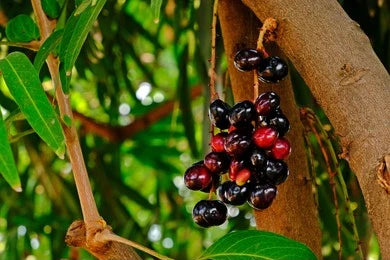Jamun is a slow-growing tree that can reach a height of 30 meters and survive for 100 years or more. The upper sections of the tree bark are light greyish and smooth, whereas the lower parts of the tree bark are dark grey and rough. This tree's wood is water resistant. The aromatic leaves offer a relaxing scent. Young pinkish leaves are evolving to leathery, glossy, dark green leaves with a yellow midrib. The leaves have a high nutritional value, provide deep shade, and are utilized as vegetation for animals. This tree's flowers are very little, white, and scented, measuring around 5mm in diameter. This tree blooms between March and April. Large berries with an ovoid form make up the fruits, which are also green when immature but turn pink and then dark crimson as they ripen. Its fruit is astringent, sweet, sour, and has the unique ability to turn the tongue purple.
General Information
Jamun is also known as jambolan, black plum, java plum, and jambul. It is a little fruit with few calories. It is a seasonal and healthy fruit with a distinct form and colors that are abundant throughout Asia. Jamun is a delicious plum-like fruit high in iron, vitamin A, and vitamin C. Fruit is consumed as a healthful snack in many regions of the world. This fruit has a delicious sweet and tart flavor. Fruits, seeds, bark, and leaves are utilized to cure a variety of serious diseases in Ayurvedic medicine. Jamun is the richest source of antioxidants and flavonoids, both of which are vital for overall body health.
The term "Fruit of God" is another name for jamun, which has great significance in Hindu mythology and religion.
Habitat
Jamun is a tropical evergreen tree native to the Indian subcontinent and portions of Southeast Asia. This species can be found in Bangladesh, Pakistan, Nepal, Sri Lanka, Malaysia, the Philippines, and Indonesia.
Classification
Kingdom - Plantae
Order - Myrtales
Family - Myrtaceae
Other Names
Latin name - Syzygium cumini
English name - Java plum, Black plum
Hindi name - Jambol, Jambul, Jamun
Telugu name - Neredu, Chettu
Punjabi name - Jamalu
Tamil name - Saval naval
Malayalam name - Naval
Kannada name - Nerale
Bengali name - Kala jam
Ayurvedic Properties
|
|
Hindi / Sanskrit |
English |
|
Rasa (Taste) |
Kashaya, Madhur, Amla |
Astringent, Sweet, Sour |
|
Guna (Physical Property) |
Laghu, Ruksha |
Light, Dry |
|
Virya (Potency) |
Sheet |
Cold |
|
Vipaka (Post-Digestive Taste) |
Katu |
Pungent |
Effects on Doshas
It balances pitta and Kapha doshas.
|
Charak Samhita |
Sushrut Samhita and Vagbhata |
|
|
Practical Uses
- Diabetes is cured by eating jamun fruit. It is an excellent treatment for hyperglycemia patients. Its low glycemic index keeps blood sugar levels stable in the human body.
- This fruit is high in iron, which makes it a natural blood purifier by ensuring a normal blood supply of oxygenated blood throughout the body.
- It is high in vitamins A and C and is extremely useful to the overall health of the eyes and skin. This herb's astringent properties keep skin healthy, radiant, and free of acne and pimples.
- Jamun has a variety of chemical components, including oxalic acid and gallic acid, which make it effective against malaria and other microbial and bacterial illnesses.
- It promotes general heart health and shields our body from the damaging effects of free radicals, which are the primary cause of cardiovascular problems.
- This fruit is used to treat digestive issues like dysentery, stomach pain, and gas.
- Asthma, bronchitis, and various lung and other conditions are also treated with it.
- This herb, which has aphrodisiac properties, is used as a tonic to cure anemia and sexual weakness as well as generalized weakness.
- Jamun bark is particularly efficient for treating leucorrhea in females.
- It is also highly helpful for problems of the nervous system like depression, tiredness, and others.
- This herb also helps to strengthen gums and teeth.
- Jamun is used to cure constipation and other pancreas-related conditions when combined with other herbs.
- Additionally, this herb is highly helpful for sore throats and mouth ulcers.
- While aggravating Vata dosha, it calms Kapha and Pitta dosha.
Part Used
Seeds, Leaf, Bark, Fruit
Dosage
- Fresh juice - 10-20ml
- Seed powder - 1-3gm
- Fruits - according to taste
Caution
- On an empty stomach, jamun fruit should be avoided.
- Milk should be had at least one hour after and before eating this fruit.

